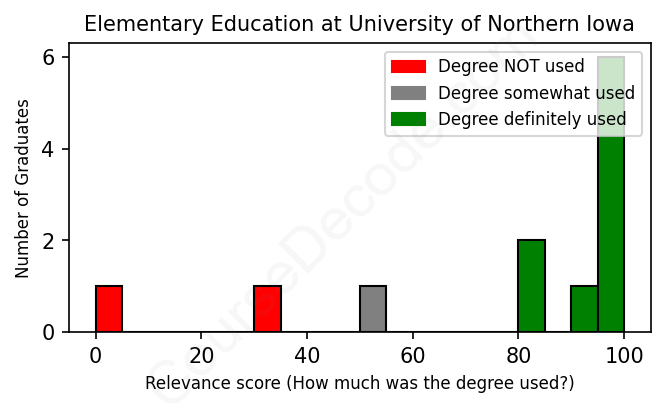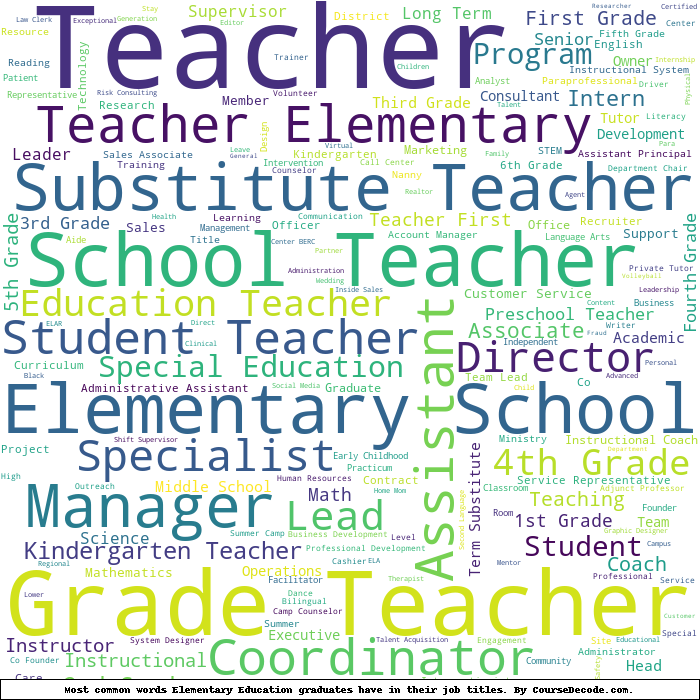
First, some facts. Of the Elementary Education graduates from University of Northern Iowa we've analyzed , here's how many have used (or NOT used) their degree in their career:

These are estimates based on AI analysis of 12 LinkedIn profiles (see below).
The verdict? Above average. Overall, with an average relevance score of 77%, Elementary Education graduates from University of Northern Iowa have a higher likelihood (+10%) of finding work in this field compared to the average graduate across all fields:
And for comparison, here's the chart for all profiles we've looked at across all degrees.
Also, after graduating, only 33% of these graduates have pursued further education other than another Bachelor's degree (such as a Masters degree or other), compared to the average across all profiles of 35%. This suggests a Bachelors degree is enough for most Elementary Education graduates, and it's normal to look for work straight after graduation.
See the details:
|
Relevance score: 100% We think this person has gone into a career highly relevant to their degree. We think this person has gone into a career highly relevant to their degree.
DEGREE INFOGraduated in 2010 from University of Northern Iowa with a Bachelor's degree in Elementary Education. Also pursued further education since (see below). JOB HISTORY SINCE GRADUATION3rd Grade Teacher Bettendorf Community School District Aug 2012 - Aug 2020 2nd Grade Elementary School Teacher  Shawnee Mission School District Aug 2020 - Present FURTHER DEGREES DONE SINCE GRADUATINGMasters Degree, General, K-12St. Ambrose University 2014 - 2016 ABOUTI am a passionate, creative and talented educator desiring a principal position in which I can improve student achievement and community with staff, students and parents using my exceptional leadership roles. |
The top 10 most common jobs done by the graduates we've analyzed (ranked most common to least) are:
When you look at the jobs held by graduates of the Elementary Education program at the University of Northern Iowa, it's clear that many have found their place in the classroom. Most of them are working as elementary school teachers, and that makes total sense. These roles utilize the training and skills they gained in their degree, like creating lesson plans, engaging with kids, and managing a classroom. For example, a lot of them are 2nd and 3rd-grade teachers, which directly connects to what they'd learned in school, showing how well their education prepared them for these positions.
However, there's a noticeable split for some grads who have veered away from teaching altogether. A handful ended up in roles like administrative positions, sales, or even as a ski shop technician, which don't really relate to their education focus. It’s a bummer for those who might have expected their degree to lead them straight into a teaching role. So, while many graduates are thriving in education-related jobs, others have found their degrees didn’t necessarily limit them to the classroom, leading to more diverse career paths that aren't always tied to elementary education. Overall, it’s a mixed bag, with a solid core of graduates still committed to teaching, but also some who are exploring completely different fields.
Here is a visual representation of the most common words in job titles for Elementary Education graduates (this is across all Elementary Education graduates we've analyzed, not just those who went to University of Northern Iowa):

Looking at the career trajectories of graduates from the University of Northern Iowa with a degree in Elementary Education, it seems like most of them kick off their careers in the education field right after graduation. Many of the individuals listed started their careers as classroom teachers. For example, graduates who finished their degrees in 2010 and 2013 both landed teaching positions shortly after graduating, and they stuck with it for several years before moving into roles like instructional coach or even principal. This pattern suggests that it’s pretty common for new grads to jump right into teaching roles, which is a great way to kick off a meaningful career in education.
However, as we look at the 5 to 10-year mark, the stories start to vary. While some have continued to advance in educational roles, like moving into administration or coaching positions, others have veered off the traditional path. A couple of graduates ended up in non-educational roles like recruiting, sales, and administrative positions, which might indicate that not everyone stays in the field. Some have found success in related areas, like special education or after-school programs, while others took routes that seem pretty far from the classroom. So, in a nutshell, while many have built solid careers in education, a fair number of graduates also drifted into other fields, which shows a mixed bag of career outcomes for those embarking on a journey in elementary education.
Honestly, a Bachelor’s degree in Elementary Education can be pretty challenging, but it’s manageable if you’re dedicated and love working with kids. At the University of Northern Iowa specifically, you’ll juggle classroom learning with hands-on field experiences, which can be demanding but also really rewarding. You’ll dive into subjects like child psychology, curriculum design, and teaching methods, plus there’s likely a lot of group projects and presentations, which some people find tougher than exams! While it's not necessarily a walk in the park, especially with the demands of teaching practice, if you're passionate about it, you’ll probably find the journey to be a pretty fulfilling one. Overall, it’s not the easiest degree out there, but it’s definitely doable if you stay focused!
Most commonly, in the LinkedIn profiles we've looked at, it takes people 4 years to finish a Bachelor degree in Elementary Education.
Looking at the job histories of these graduates from the University of Northern Iowa, it seems like they’ve generally landed in pretty decent positions, especially those who went into teaching and administrative roles. The first few graduates, who spent years in classrooms and have climbed the ladder to roles like principal, probably make a solid salary, especially with experience in their field. Teaching jobs, particularly in certain districts, can pay well, and administrative positions often come with even higher pay. On the flip side, some graduates have taken on roles that seem more entry-level or part-time, which might not be the best for making bank. Ultimately, it looks like the more experienced teachers and administrators are likely doing alright financially, while those in more casual or part-time jobs might not be pulling in as much cash. So, yeah, it’s a mixed bag!
Here is a visual representation of the most common words seen in the "about" section of LinkedIn profiles who have a Bachelor degree in Elementary Education (this is across all Elementary Education graduates we've analyzed, not just those who went to University of Northern Iowa). This may or may not be useful:

Here are all colleges offering a Bachelor degree in Elementary Education (ordered by the average relevance score of their Elementary Education graduates, best to worst) where we have analyzed at least 10 of their graduates: